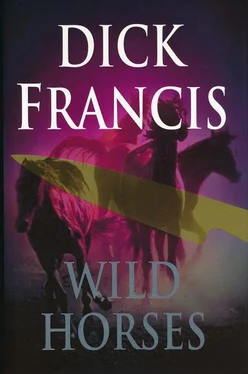‘Her dreams and illusions are in the screenplay,’ I reminded him. ‘Her lovers are jockeys, the way you wrote them. But who were the real jockeys? Did they ride the horses her husband trained?’
‘They were in her mind.’
‘But why did she hang, Howard? Was she topped by one of the dream lovers? Did she do it herself? Did her husband kill her?’
After a pause he said, ‘No one knows.’
‘I know they don’t,’ I said. ‘At least, no one ever told. But an ending of no explanation at all isn’t going to get people paying to see the film.’
He said sarcastically, ‘That bottom line again.’
‘I’ll give you the dream lovers,’ I said. ‘And you’ll allow me an earthly explanation.’
‘That’s not fair.’
I gazed at him. He was old enough to know that few things were fair. Most five-year-olds had already discovered it.
‘What we are dealing with here,’ I said, changing tack, ‘is three versions of the same story.’
‘What do you mean?’
‘We have the story you wrote in your book. We have the story we’re shooting in the film. And somewhere out of sight, way back in history, is what actually happened. Three views of the same facts.’
Howard didn’t argue.
I said, ‘By Sunday, Howard, I’d like you to come up with a rational explanation of the wife’s death.’
‘But it’s already Thursday evening!’ he exclaimed, horrified.
‘You’ve had literally years to work it out.’
‘But no one knows!’
‘Then guess.’
‘I can’t,’ he protested belligerently, ‘I’ve tried.’
‘Then I’ll do it,’ I said. ‘I’ll work with you on the necessary scenes. We’ll use most of your script as written, but your inconclusive ending is impossible.’
‘But it’s what happened . There wasn’t any ending to the story.’
‘For the film, there has to be.’
‘Don’t you care about the facts?’
‘Perhaps, if we look closely enough,’ I said, only half meaning it, ‘we might ourselves uncover those facts. What if we actually could find out what really happened?’
‘You can’t,’ Howard said flatly. ‘No one knows.’
‘No one’s saying. That’s different.’ I paused. ‘What did Jackson Wells tell you, when you went to see him?’
O’Hara had asked Howard the same thing, he’d told me, and Howard, to O’Hara’s utter disbelief, had said he hadn’t consulted Jackson Wells at all. Howard hadn’t thought it necessary. Howard didn’t want to risk unwelcome anti-climactic disclosures from Jackson Wells that might upset his lyrical tale of the dream lovers and the semi-mystical death.
Moncrieff, strolling into the bar, seeing us, and crossing without hesitation to join us, saved Howard from having to answer.
Howard and Moncrieff disliked each other without making much overt display of it. Moncrieff, no reader of novels, thought Howard a prissy, impractical, pseudo-intellectual nuisance on the set. Howard’s expression made no attempt to disguise his disparagement of Moncrieff’s unkempt appearance with the small straggly beard that was halfway between an artistic statement and a lazy approach to shaving.
Neither of them had the least understanding of the other’s function. Moncrieff, endlessly creative within the effects of lighting, needed to be given the actors, the scene and the intention of the storyline, but his enormous input was a moonshot outside the range of Howard’s comprehension. Each of them, being acclaimed as individualists, wholly believed that it was he who was indispensable to any chance of esteem for the finished film.
As Nash Rourke tended to think the same, also O’Hara, also myself and also the film editor who would cut some of his own opinions into our work, it was unlikely that anyone would end up wholly satisfied, even if the public approved. Howard, though he didn’t seem to appreciate it, at least had more control of his own work than most authors.
‘What about those dream lovers, then?’ Moncrieff asked abrasively.
Howard became predictably defensive. ‘The wife imagines them. You don’t need to worry about it.’
‘Oh, yes, he does,’ I corrected mildly. ‘ She may be imagining the jockeys, but we, the onlookers, are going to see them standing in her bedroom.’
Howard looked aghast, to Moncrieff’s amusement.
‘One at a time,’ I explained. ‘She sees one in her bedroom. Another time, she sees another. And another. We have three tall ultra-handsome unknowns coming to dress up as the dream lovers. They won’t look like real jockeys. They don’t speak, and don’t worry, Howard, they won’t get into bed. The wife watches her husband from her bedroom window as he rides out with his string of horses to their morning exercise, then she turns into the room and conjures up her dream jockey lover. Moncrieff will light the jockey to make it clear that he’s imaginary. Another day the wife will wave to her husband, and then turn and imagine a different lover.’
Moncrieff nodded. ‘Easy.’
‘She dances with the third lover. Slowly, orgasmically. She’s transported,’ I said.
Moncrieff happily nodded again.
‘So there you are, Howard,’ I said. ‘The lovers are how you wrote them. No sex.’
‘All highly unlikely,’ Moncrieff laughed. ‘Any jockey worth his salt would have her nightie off before her husband was out of the stable yard.’
‘She hanged,’ I said. ‘No dream.’
Both of them stared, silenced.
Why did she hang, I wondered. The further we went with the filming, the more I wanted to know, yet until then it had been the results of that death, the accusations against her husband, and his handling of them, that had been the focus both of Howard’s book and, more especially, of our film version.
I gave a mental shrug. I hadn’t time for any inept detective work, trying to unearth a secret twenty-six years buried. I had only to bully Howard into inventing a good reason and giving Nash a huge satisfactory last scene in which he discovered the truth — Howard’s version of the truth — to end the film in perhaps cynical heroism.
‘What made you write the book?’ I asked Howard.
‘You know what did. A newspaper article.’
‘Do you still have it?’
He looked surprised and, as usual, displeased. ‘Yes, I suppose so,’ he said grudgingly, ‘but not here.’
‘What paper was it in?’
‘I don’t see that it matters.’
Howard himself, in the ensuing pause, seemed to agree that he’d been unnecessarily ungracious.
‘The Daily Cable ,’ he said. ‘It was an obituary of the member of the Jockey Club that I called Cibber in the book.’
I nodded. That much I knew. ‘What was Cibber’s real name?’
‘Visborough.’ He spelled it.
‘And who wrote the obituary?’ I asked.
‘I’ve no idea,’ Howard replied, still obstructively but this time with a surprise that gave his statement credence.
‘Didn’t you follow it up?’ I asked.
‘Of course not.’ Howard became condescending. ‘You’ve no idea how a creative author writes. The inconclusiveness of the obituary was its own inspiration. I received the idea from the obituary and the book grew in my mind.’
‘So,’ Moncrieff said, ‘you never even tried to find out what really happened?’
‘Of course not. But I didn’t alter the account given in the obituary, not like O’Hara and Thomas have made me alter things for the film.’ He was acridly bitter. ‘My readers will hate the film.’
‘No, they won’t,’ I said, ‘and hundreds of thousands of new readers will buy your paperbacks.’
He liked that idea, however he might carp. He preened, smirking. Moncrieff’s dislike of him visibly grew.
Читать дальше












